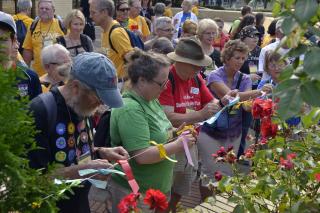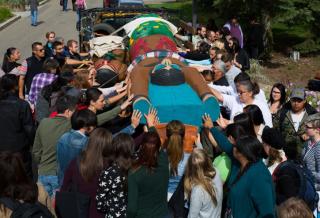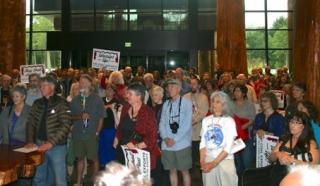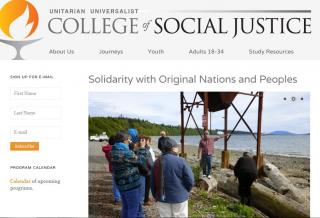Bellingham, WA
This piece is adapted from the blog of Commit2Respond: People of Faith and Conscience Taking Action for Climate Justice, posted July 31, 2015 by Beth Brownfield and Deborah Cruz
How Can We Serve?
Though Bellingham sits across the Bay from Lummi Nation, and the Nooksack Indian Tribe is only 30 miles up the road, most residents had limited knowledge or experience with their Indigenous neighbors. Bellingham UU Fellowship member Beth Brownfield made contacts over time with members of the Lummi and Nooksack Nations. In 2006 she learned that Lummi Nation was hosting the 2007 Tribal Canoe Journey, an important event for Tribes around the Pacific Northwest to celebrate and share their cultures. Up to 60,000 people were expected to visit during the six-day event, and Lummi Nation would be feeding 5,000 of them for breakfast and dinner each day.
Beth asked Lummi if volunteers, donations of food and money, or other services would be helpful and received an enthusiastic yes. Beth jumped into action and asked for help from her congregation. A committee from the fellowship was formed that worked with the Lummi Canoe Journey planning committee. Volunteers secured contributions of between $60,000 and $80,000 in cash, goods, and services. Ten thousand people attended the landings of the canoes at the start of the event and hundreds of volunteers from the county worked over the next six days doing whatever was called for: cooking, directing traffic, picking up trash, passing out water, etc.
The entire experience, from start to finish, broke new ground between Indigenous and non-Indigenous communities. Stereotypes were shattered on both sides, friendships made, and experiences shared. The outpouring of support opened doors for greater engagement and collaborations between Whatcom County and Lummi Nation communities.
Interfaith and Cross-Cultural Partnerships for Environmental Justice and Indigenous Rights
A Native American Connections Committee was launched at BUF. From the small group of Canoe Journey volunteers interest has grown to almost 70 Bellingham Unitarian Fellowship congregants. Actions and activities have included:
- Initiated and coordinated local “Coast Salish Days” events in 2007, 2008, 2009, and 2011 in collaboration with Lummi Tribal leaders. These were community celebrations, including canoe landings and cultural sharing, that honored the first inhabitants of local lands and waters.
- Worked with two Lummi tribal members to plan and conduct a 2014 “Sacred Summit,” open to the public, to celebrate the land, the water, and the protection of Sacred Sites.
- Initiated a UUSC “Just Works” Project in Clinton, OK at the Cheyenne Cultural Center to support a Mennonite-sponsored “Return to the Earth,” national effort to repatriate unidentified ancestral Indigenous remains for honorary reburials. Forty-five congregants participated in four workshops, built six cedar burial boxes, and sewed six burial cloths for the project. These items were blessed by the congregation at a Sunday service, before three members joined other UUs from around the nation for a seven-day work camp.
- Initiated a cross-cultural discussion group with forty people from the community, including seven Indigenous members.
- Collaborated with a Lummi videographer to create a documentary based on interviews with four Lummi Tribal members about how non-Indigenous people can become partners and allies.
- Worked within the UUA on education that led to the UUA’s repudiation of the Doctrine of Discovery in 2012.
- Applied for and received a UUA Doctrine of Discovery seed grant to host a teacher training for an HonorWorks curriculum that examines the heritage of Native Americans in Whatcom County, Washington, and explores issues such as stereotypes, differing cultural perspectives, and discrimination between the diverse populations that make up our community.
- Provided workshops, lectures, and book and movie discussions that were attended by community leaders, faith leaders, teachers and others.
The Native American Connections Committee provides ongoing lectures, documentaries, Sunday morning forums, fundraisers, and volunteer opportunities for Indigenous efforts.
In 2010 SSA Marine Company submitted a permit application to build the largest coal port in North America at Cherry Point: the Gateway Pacific Terminal. Bellingham Unitarian Fellowship’s Green Sanctuary Committee became involved in interfaith efforts to oppose the project. Lummi Hereditary Chief Bill James spoke at an interfaith educational forum in August 2012. He discussed the impact the terminal would have on Lummi Nation, speaking to the cultural and historical significance of the lands and waters of Xwe’chi’eXen (the Lummi name for Cherry Point), the site of an ancient Lummi village and burial grounds dating back 175 generations, as well as the potential destruction of the Lummi way of life posed by the terminal’s threat to Northwest First Nations’ fishing grounds.
Lummi leaders asked BUF’s Native American Connections Committee to assist in bringing the Lummi message about the terminal to the rest of the Whatcom Community, especially to the faith community. BUF organized two presentations by Lummi Nation about the Gateway Pacific Terminal: one for faith representatives and one for community activist organization representatives. The greater community responded with a groundswell of support. Members of faith communities developed an “Interfaith Statement of Solidarity with Lummi Nation,” signed by Jewish, Buddhist, Christian, and Unitarian Universalist members, boards, councils, congregations, and leaders both locally and regionally.
Lummi Nation organized a series of Totem Pole Journeys to raise awareness and make connections with other Nations. In the summer of 2013, the first totem pole, carved by Master Carver Jewell James started its journey in Lame Deer, MT, site of one of the proposed largest coal mining projects at Otter Creek, and made several stops along the coal train route that would be impacted by the Gateway Pacific Terminal and other fossil fuel extraction and exportation projects. Along the route, the totem pole received blessings from Native and non-Native communities alike. It ended its journey where it now stands as sentinel over North Vancouver Island, British Columbia, home of the Tsleil-Waututh, who are also being adversely impacted by fossil fuel extraction and exports projects.
The second journey a year later was organized by Lummi, BUF, and activist community members. BUF hosted several events before and during the Journey, as well as a fundraising concert, raising $7,000 for the food costs of the journey. Kicking off in Bellingham at BUF, this second totem pole journeyed to areas impacted by coal mining, tar sands, oil refining, and export facilities in South Dakota, Montana, Washington, British Columbia, and finally to Alberta to the Beaver Lake Cree Nation, where it now stands sentinel over the Canadian tar sands. Stops were made along the way at many Native and non-Native communities, where people offered blessings and shared their stories about the struggles against the fossil fuel industry. A 20’ x 216’ mural was also part of the journey, allowing community members to paint their sorrows and hopes into a piece of art that is a stunning display of voices and messages. Unitarian Universalist congregations were invited to attend and participate in the blessing stops along the journey.
From Local, to Regional, to National and Beyond
The authentic, mutual relationships between BUF and Lummi Nation have had strong impacts on both sides.
Since 2007, BUF members have used their connections and access to remind groups, organizations, and governmental bodies to include Indigenous members and points of view in their processes and plans. As a result tribal members and culture are recognized and included in everything from peacemaking and social justice organizations, to film and theater centers, to regional museums. BUF members also serve as a bridge from the larger community to Lummi Nation, facilitating connections for students doing research projects, groups and teachers looking for speakers, and people who have cultural questions.
It has not always been easy. Racism and ethnocentricity are alive and well. There are non-Native people in the county, state, and nation who believe that American Indian Nations shouldn’t exist anymore. Some believe Indigenous peoples should assimilate to make life easier for both Native and non-Native people. Others worry that if the broader community honors Original peoples, other ethnic and cultural groups will demand to be equally recognized. For still others, the history is so painful that they do not want to think about it, preferring to leave the past in the past and wanting Native people to “just get over it.”
But the work is worth it. In 2015 Bellingham Unitarian Fellowship’s dreams came true when they were able to help initiate and organize new collaborations between the entire UU denomination and Lummi Nation. They received the 2015 Bennett Award for social justice in recognition of their work.
The UU College of Social Justice has had a service/learning program at Lummi Nation. A collaborative “Sacred Public Witness,” took place at the UUA’s General Assembly in Portland, OR, in June 2015, and was attended by 2,500 people who witnessed in solidarity with Lummi Nation, made spiritual commitments to climate justice, and were called on to take action, take it home, and support a third Totem Pole Journey. Many seeds have been planted in the community, in the county, in the state, in the nation, and beyond. It doesn’t get any better than that!
Beth Brownfield and Deborah Cruz are members of Bellingham Unitarian Fellowship in Bellingham, WA, and leaders of BUF’s Native American Connections Committee.



